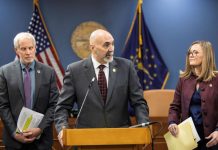Commentary: The Minimum Wage And The Coming Flood
written by John Krull
TheStatehouseFile.com
INDIANAPOLIS—Much ink and hot air have been thrown at the subject of a federal minimum wage increase in recent months.
Too much, in fact.
Conservatives rail that increasing the minimum wage will drive the prices of fast food to astronomical heights. Progressives argue that not increasing the minimum wage degrades the value of honest work and allows employers to exploit workers.
As is so often the case with these symbolic debates, both sides have a point.
It is, after all, one of the curses of our times that so many people are convinced that because they have a grasp on a piece of the truth, they own the whole of it.
The reality is more complicated.
It also is more alarming, because understanding that reality makes clear just how little we are doing to prepare for the challenges ahead.
Knowing facts will help here.
The Bureau of Labor Statistics reports that the percentage of Americans earning the federal minimum wage or less declined last year.
In 2019, 1.9 percent of American workers earned $7.25 per hour or less.
In 2020, the percentage dropped to 1.5 percent.
The drop wasn’t the result of any innovative government program or bold new venture by American businesses.
Economists have been warning for the better part of a decade that the world is headed toward a labor crisis. Those economists project that, by the year 2030, there will be a significant labor shortage—one perhaps as great as 25 percent.
The economists are not likely to be wrong about this. In some ways, this is just a math problem. Everyone who will be in the workforce nine years from now is alive today. If there are fewer people who are of working age, due to slowed birth rates and other factors, and there are more people who cannot work, because of greatly extended life spans and other developments, then determining whether there will be a shortage—and, therefore, a crisis—is simply a matter of crunching numbers.
This shortage—this crisis—will transform the ways we work and live.
If there are not enough bodies to do the work we need to be done, then countries, states, and communities will start competing to recruit and hold onto labor.
That will drive up wages.
Actually, it will do more than that.
One of the barriers that historically has prevented low-wage earners from taking advantage of better opportunities has been, for lack of a better term, transition costs. Too often, workers haven’t been able to afford to move to other places to secure greater compensation or to take time away from work to get jobs that pay better.
The pressure to secure labor is going to force communities that want to survive, much less thrive, to induce workers the way they long have lured companies. They’ll offer packages to subsidize moving and training costs to attract workers to their city, their state or their country.
The relationship between business and labor also will be altered.
Put simply, when workers are scarcer than jobs, labor’s leverage will increase dramatically. Expect savvy companies to start seeking out ways to collaborate more with workers—and to start demonstrating that such companies are attuned and attentive to their employees’ concerns.
We’re already seeing signs of that.
The corporate boycotts of Georgia and other states engaged in voter suppression efforts have less to do with companies developing social consciences than they do with companies understanding what is necessary for them to survive. They can’t afford to alienate potential pools of labor, so they’re not going to insult Black voters or engage in anti-gay persecutions or pursue any social or political agenda that might cost them workers.
This coming age of labor shortages will require countries, states and communities to dispense with wage suppression measures such as Indiana’s right-to-work law and other anti-labor measures. The new model for successful economies will be one of cooperation and a more nuanced balancing of interests.
Arguing about the federal minimum wage is a bit like arguing about where a dam will break when the water pressure is building at every point along the wall.
The important thing is that a flood is coming.
But then, it’s easy to fight about something like the minimum wage.
Fights are always easier to find than solutions.
FOOTNOTE: John Krull is the director of Franklin College’s Pulliam School of Journalism and publisher of TheStatehouseFile.com, a news website powered by Franklin College journalism students.
The City-County Observer posted this article without bias or editing.







This is the United States of America, and the 2021 economy is going gangbusters.
Upwards wage pressure? It is a sign of STRENGTH. (A good problem to have.)
Imagine that. More jobs than there are people! What a country!!!
Republicans, before Trump – and after Trump – used to be the Party of pro-business, strong economy, low unemployment and strong national defense that identified Russia as THE EVIL EMPIRE.
That is how screwed up Trump was. The guy is an absolute disaster – loved by white nationalist racists – but not REAL Republicans.
Comments are closed.